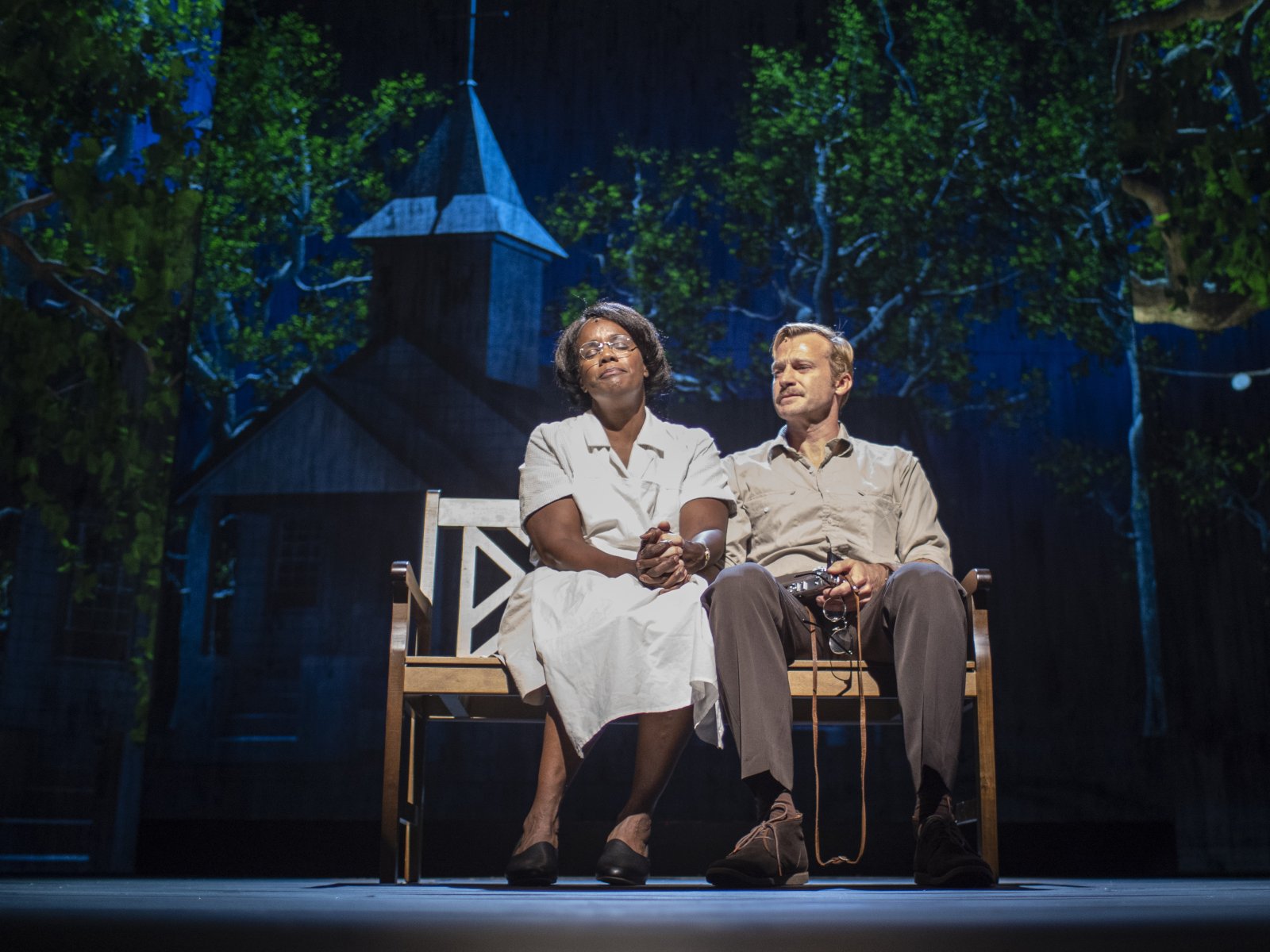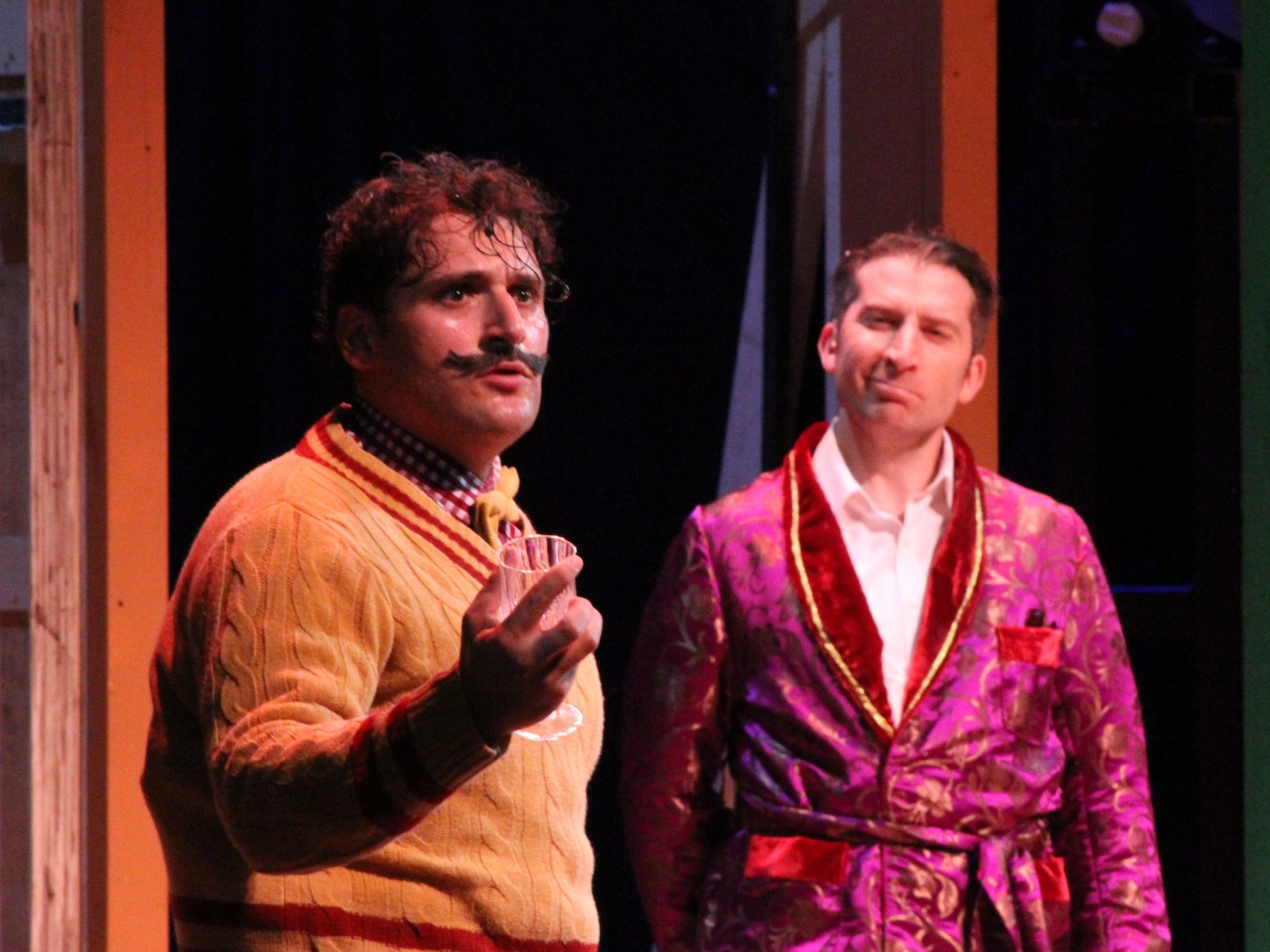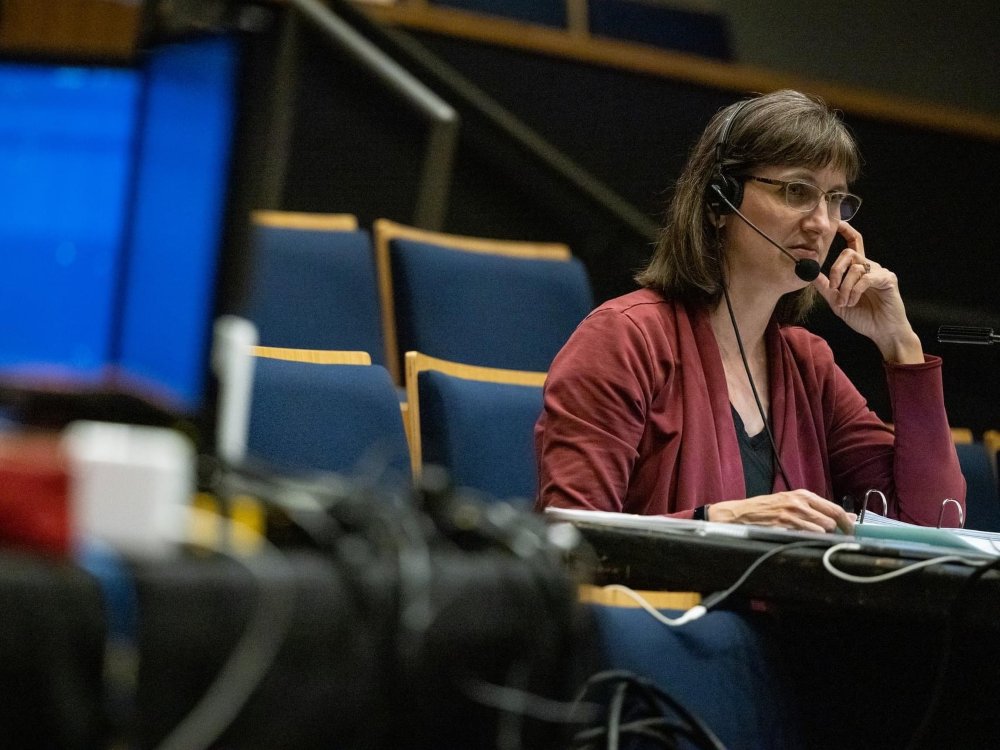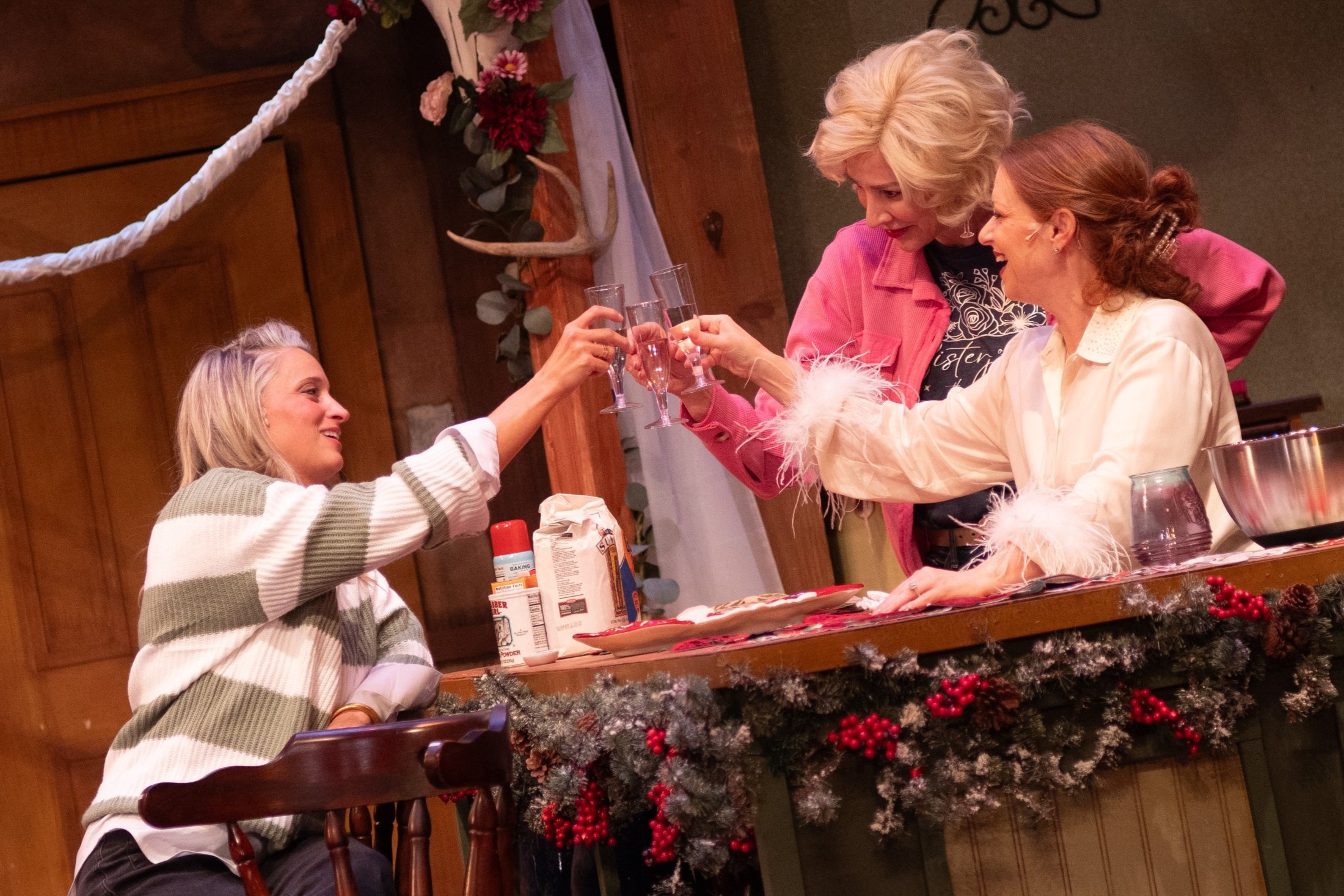As one of the biggest and fastest growing U.S. cities, it is only right that Houston has a vibrant live arts scene. While its Equity community has long been established and tight knit, in recent years contract opportunities have picked up with the pace of the growth. Among new local theatres contributing to that growth, A.D. Players at the George Theater has burst onto the scene as an example of why increasingly Houston is not just a great city, but a great city to be an Equity member.
A.D. Players has been a Houston institution since 1967, albeit one largely in a niche, known as a small repertory company performing theatre centered on Christian themes and stories. (The name evoking the Christian calendar is a coincidence; the A.D. actually stands for "After Dinner," referring to the idea that actors could always expect a meal before a performance.) They occasionally hired Equity members on the Guest Artist Agreement, but most union actors and stage managers in Houston had little interaction with the company. But in 2017, the company opened their current home, the George Theater, and the employers reached out to Equity about establishing a relationship. Since then, A.D. Players has largely operated on a Letter of Agreement that references the League of Resident Theatres Agreement.
"It's a very warm and welcoming place, so we all jumped on pretty quickly," said Houston Equity Community leader Joel Sandel about the shift.
The new location is unusual, away from most theatres in town and surrounded mainly by offices and retail, but it's in a central part of Houston and highly visible from a well-trafficked road. The company first acquired the land in 2003, it took until 2017 to finally open a show there, to the wonder of audiences – and potential employees.
"The new facility is gorgeous," said Sandel, who has worked for A.D. Players as an actor and a director. "It's probably the prettiest theatre in town, so we all wanted to be a part of it."
The George's capacity is now 440, but multiple Equity members who have attended shows there attested that there is not a bad seat in the house. They also say the smart design extends to the back of house as well.

Equity members Rosalyn Coleman and Robert Eli in Miss Maude.
Photo by Jesse GrothOlson.
These days, A.D. Players mounts five mainstage shows a year, in addition to an annual gala in-house. They also rent out the space for events like concerts.
Equity member Alice M Gatling, who has worked at A.D. Players as both a performer and a director, is Christian, and she finds the company to be an institution that lets her couple her art with her faith, whether it be the opt-in prayer circle before a performance or the specific shows they mount.
"When I get a script from them, I don't have to think about the content," she said. "They create such a loving and supporting environment. They truly recognize that there is a spiritual element to what we do as performers."

Equity members Gabriel Regojo and Nick Farco in The Play That Goes Wrong. Photo by Jesse GrothOlson.
However, Equity members who do not identify as Christian insist that A.D. Players is comfortable and welcoming to all; they see it as a theatre making great art – and offering great jobs – in Houston.
"They're just the loveliest people to work for, from the box office to the people they hire for backstage crew to people that work there full time," said Equity member Kara Greenberg. "Everyone is just so lovely and just loves what they do. So when everyone around you loves what they do, it's very contagious."
This welcoming environment is not an accident, but what employers say is a conscious effort to create a healthy workplace. For Equity members of marginalized backgrounds, A.D. Players also lives out their values when it comes to diversity in the workplace.
"As an African-American artist I have been in spaces where my voice is considered to be less than," said Gatling. "Your suggestion does not carry as much weight as other voices. I don't feel that at A.D. Players. When I'm at the helm as a director, the respect is there. When I'm in the trenches as an actor, the respect is there. And that does nothing but fuels my creativity. It makes me want to do a better job. It makes me want to dig deeper."
The team at A.D. Players originally saw building a relationship with Equity as a path to greater prestige – and to bringing in more actors and stage managers. Now, they cannot imagine working without the union artists they have come to know. But they have also come to see their union status as an expression of their values of treating everyone with respect.
"One of the things we've learned is it doesn't matter what your intentions are if there's not a safeguard in place," said Dean. "A relationship with a union gives you a good framework, and it holds you accountable to the safeguards that we all know deep down need to be in place for artists: a living wage, security measures, how are you taking care of folks."
"They treat their staff and anybody that comes in to work with them with exceptional compassion," said Equity Western Stage Manager Councilor Rebecca Skupin. "When problems come up, they are not dealt with with a sledgehammer; they're dealt with with a scalpel."
Skupin was the first stage manager A.D. players ever hired on Equity contract, and members and employers alike say she was instrumental in helping with the transition to being a union theatre. Switching to productions with mostly Equity members was a learning curve, and the employers quickly learned to rely on members to better understand what was expected of them.
"When someone comes to them and says, 'Hey I think this is a problem,' they recognize that the Equity rulebook is the contract they signed, which so many producers seem to not get," get Skupin, noting that their empathy towards others never comes at the expense of enforcing the rules.

Equity Western Stage Manager Councilor Rebecca Skupin. Photo by Jeff McMorrough.
"They're great with all of the minutiae of Equity rules and regulations and follow them beautifully," said Sandel.
"They always make you feel like you can come to them about things," said Greenberg, who has served as Equity deputy at A.D. Players. "It's great, it's fair – we've added performances and extended according to the contract."
As it stands now, few if any Equity members in Houston earn a full-time living solely working on union contract at local theatres. However, employment opportunities were expanding when COVID hit, and now they seem to finally be bouncing back. A.D. Players is a factor there, in part because of its welcoming nature (The George has hosted the Equity Houston community's famous ice cream social twice), but not least of which because the pay tends to be amongst the best in the city.
"The rate of pay and the artistic value of the shows have made a huge jump since becoming Equity," said member Orlando Arriaga, who was an actor in the older iteration of the company for several years before joining the union.
While A.D. Players stands out to Equity members for its welcoming and supportive environment, that also tracks with the city on a whole.

Amy Mire, Elizabeth Marshall Black and Equity member Kara Greenberg in A Texas Carol.
Photo by Miranda Zaebst.
"Houston is an oddity because it has these 10 or 12 Equity houses, and we all kind of know each other," said member Dain Geist, who said that many companies comfortably occupy their own niches for different kinds of work, and Equity artists tend to move fluidly between them. "There's no bad blood."
"This is a very strong, supportive theatre community," agreed Skupin. "It's not a community where somebody gets a job you thought, 'Damn I really wanted that job!' You say, "Yay, I'm really happy you got that job!"
A.D. Players is still growing, and despite feeling like a home company for many Equity members, they audition new talent all the time. Now, as they conclude their season and gear up for the fall, they continue to build on initiatives like their education program and sensory-friendly performances, the latter of which they pioneered in the Houston area. Equity members who have worked there are eager to see what the future holds, for the theatre and for the city.
"There's work to be had, and it incrementally continues to get better," said Sandel. "It's feeling more and more like we're back."
